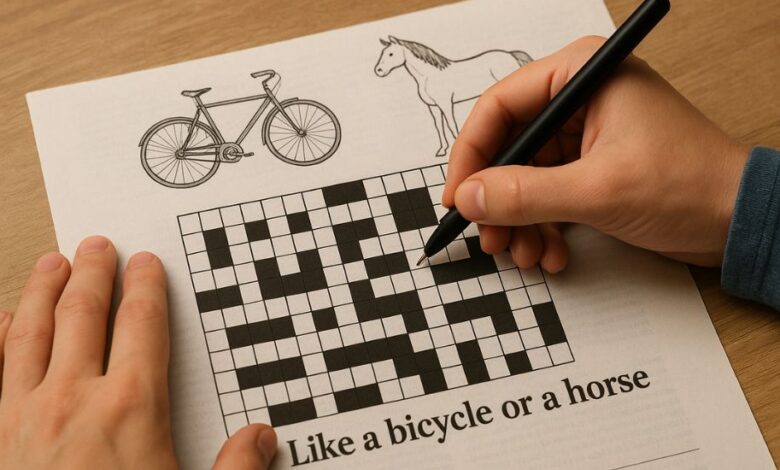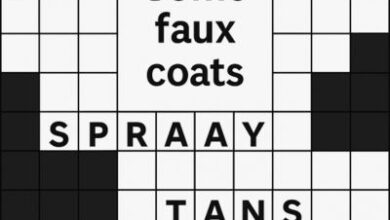Like a Bicycle or a Horse Crossword – Meaning, Clue Explanation & Solver’s Guide

Crossword puzzles have long been a source of both entertainment and mental stimulation. Every day, millions of people open their newspapers or digital crossword apps to test their word knowledge, logic, and reasoning skills. Among the many clues that intrigue solvers, one that has recently gained attention is the phrase “Like a bicycle or a horse” — a deceptively simple clue that hides its answer in plain sight.
Let’s take a detailed look into what this crossword clue means, how to solve it, why the answer is RIDABLE, and what makes it an interesting example of crossword construction.
Understanding the Clue: “Like a Bicycle or a Horse”
At first glance, this clue appears to describe two completely different objects: a bicycle and a horse. One is a mechanical invention, the other a living creature. However, when you approach this clue from a crossword-solver’s mindset, the question you must ask is — what do both of these things have in common?
The answer lies in the action associated with them.
You can ride both a bicycle and a horse. Therefore, something that is like a bicycle or a horse would be ridable (sometimes spelled “rideable”).
That’s the simple reasoning behind the answer RIDABLE — the seven-letter adjective meaning “capable of being ridden.”
The Correct Answer: RIDABLE
The solution RIDABLE (7 letters) fits both grammatically and semantically.
- Definition: Capable of being ridden.
- Word form: Adjective.
- Example usage:
- “The trail is ridable after the rain stopped.”
- “A horse is ridable when trained properly.”
- “Electric scooters are ridable on smooth terrain.”
The clue “Like a bicycle or a horse” is, therefore, a definition clue — one of the most direct and literal types found in crosswords. It does not rely on wordplay or cryptic hints; instead, it points straight to the meaning.
Where the Clue Has Appeared
This particular crossword clue has been seen in several popular puzzles and online crossword databases:
- New York Times Crossword (August 24, 2025) – where it was listed with the answer RIDABLE.
- CrosswordAnswers911 and Wordplays.com – both record the clue appearing once with the same solution.
- Try Hard Guides and Crossword Buzz – popular crossword helper websites that provide the clue, possible answer, and reasoning.
Such databases often archive clues and their answers, helping solvers verify their guesses and track patterns in puzzle construction.
Why “RIDABLE” and Not “RIDEABLE”?
A common question among crossword enthusiasts is: why not “rideable”?
Both spellings are technically correct in English. However, in crossword puzzles, letter count and dictionary standardization matter. The spelling RIDABLE is recognized in most American dictionaries (like Merriam-Webster) and is the preferred shorter form used by puzzle editors to fit grid constraints.
Crossword compilers usually opt for the simplest or most concise spelling that still conveys the correct meaning, which explains why “ridable” is favored.
Breaking Down the Clue: Step-by-Step Solver Approach
Crossword solvers follow certain reasoning patterns to reach answers. Let’s apply that logic to this clue:
- Identify the structure.
The clue does not use wordplay, anagram, or pun indicators. It’s straightforward — meaning it defines something by example. - Look for common features.
What connects “bicycle” and “horse”? Both are things you ride. - Turn the shared quality into an adjective.
What describes something that can be ridden? Ridable. - Check the letter count.
If the puzzle says (7 letters), ridable fits perfectly. - Confirm with cross letters.
Using intersecting answers in the crossword helps validate the choice.
This method illustrates how skilled solvers quickly derive answers by identifying the semantic relationship between clue parts.
Types of Crossword Clues: Where This One Fits
The clue “Like a bicycle or a horse” falls under the definition or descriptive clue type — where the entire phrase points directly to the answer. Unlike cryptic crosswords that involve hidden wordplay, this clue gives a clear example of what the answer describes.
Here are some related clue-types for comparison:
| Clue Type | Example | Solution | Explanation |
|---|---|---|---|
| Definition | “Like a bicycle or a horse” | RIDABLE | Directly describes what is capable of being ridden |
| Synonym | “Capable of being ridden” | RIDABLE | Uses synonymous phrasing |
| Example-based | “Like a skateboard or scooter” | RIDABLE | Both are ridden |
| Cryptic | “Able to take a ride” | RIDABLE | Hidden play on “ride” |
Understanding these categories helps solvers identify patterns and improve their puzzle skills.
Common Misconceptions and Solver Pitfalls
Even though the clue seems easy, some solvers may overthink it. Common mistakes include:
- Guessing “mounted” or “ridden” – These words describe the act or state of riding, not the capability.
- Thinking of nouns instead of adjectives – The clue uses “like,” which calls for a descriptive word.
- Ignoring letter count – Always match the number of letters indicated in the puzzle.
- Misspelling “rideable” vs “ridable” – As explained earlier, crosswords standardize spelling for consistency.
By keeping these details in mind, solvers can refine their accuracy and solve faster.
The Linguistic Angle – History of “Ridable”
The word ridable dates back to the mid-19th century, derived from the verb ride + suffix -able.
Its meaning has always been straightforward: “suitable for riding.” Interestingly, ridable applies to many contexts — animals, vehicles, terrain, or even waves (as surfers say “ridable waves”).
Over time, both “ridable” and “rideable” gained popularity, though modern editors prefer the shorter version. In crossword culture, concise words often prevail since space and symmetry in puzzle grids matter.
Examples of “Like a Bicycle or a Horse” Style Clues
If you enjoy this clue, here are similar examples of descriptive crossword clues that share the same logic:
- Like a boat or a plane → FLOATABLE or AIRBORNE
- Like a fish or a submarine → UNDERWATER
- Like a car or a train → MOTORIZED
- Like a pen or a pencil → WRITABLE
- Like a bee or a butterfly → WINGED
Each of these clues follows the same reasoning pattern — identifying what the examples have in common and converting that shared trait into an adjective.
Crossword Solving Tips
For new solvers who find clues like “Like a bicycle or a horse” challenging, here are a few tips:
- Read clues literally first.
Most simple clues don’t hide tricks — they state exactly what they mean. - Think of categories.
If two or more examples are given, focus on what unites them. - Pay attention to word form.
The grammar of the clue (adjective, noun, verb) often matches the answer type. - Use crossing words.
Confirm answers using intersecting clues to avoid errors. - Practice daily.
The more puzzles you solve, the more instinctive clue recognition becomes.
Cultural Popularity of Crosswords
Crosswords are not just a pastime; they’re a cultural phenomenon. Originating in early 20th-century newspapers, they now dominate digital platforms and mobile apps.
Clues like “Like a bicycle or a horse” showcase the simplicity and brilliance of crossword design — how language, wit, and logic intersect to form a moment of “Aha!” satisfaction for solvers.
Even simple clues reinforce vocabulary and analytical skills, which is why crossword solving is considered a form of mental exercise worldwide.
Why Clues Like This Matter for Language Learners
Clues such as “Like a bicycle or a horse” are particularly effective in helping learners understand semantic grouping — recognizing how different nouns share an adjective.
They enhance language learning by improving word associations and descriptive vocabulary.
For example:
- A ridable object is one you can mount or operate by riding.
- This helps English learners connect meaning through context rather than direct translation.
Such puzzles act as subtle teachers, enriching both vocabulary and logical thinking.
The Enjoyment Factor – Why Solvers Love Such Clues
Many crossword enthusiasts note that clues like “Like a bicycle or a horse” are satisfying because they combine simplicity with wit. They feel “gettable,” yet they reward attentiveness.
It’s that perfect balance of accessibility and insight — the kind of clue that even beginners can solve, but seasoned solvers still appreciate for its elegance.
Conclusion
The clue “Like a bicycle or a horse” is a brilliant example of how crosswords distill logic and language into compact form. The correct answer, RIDABLE, represents not only the linguistic connection between two different entities but also the joy of deduction that every crossword lover cherishes.
By analyzing the relationship between words, recognizing grammatical cues, and applying reasoning, anyone can master clues like this. Whether you’re solving a New York Times puzzle or a casual online game, clues of this type remind us that language can be playful, precise, and endlessly rewarding.
And as you continue exploring crossword puzzles and their clever wording, remember — it’s all about recognizing the patterns hidden in plain sight.
Article Written by [Newsta Team], Published on Newsta.
Thanks for read our article if you want more like this kind of article visit our site Newsta, and comment us. We provide authentic & comprehensive information to our readers.
1. What is the answer to the clue “Like a bicycle or a horse”?
The correct answer is RIDABLE. It means “capable of being ridden,” which applies to both a bicycle and a horse.
2. Where did the clue “Like a bicycle or a horse” appear?
This clue appeared in multiple crossword databases and notably in The New York Times Crossword (August 24, 2025). It’s also listed on solver sites like CrosswordAnswers911 and Try Hard Guides.
3. Why is the answer “RIDABLE” and not “RIDEABLE”?
Both are correct spellings in English, but RIDABLE is the shorter and more commonly used form in crossword puzzles because it fits standard American dictionary spelling and grid length constraints.
4. What kind of crossword clue is “Like a bicycle or a horse”?
It’s a definition clue, meaning the entire phrase directly defines the answer. It doesn’t use any cryptic tricks or hidden meanings — it’s a straightforward example-based definition.
5. How can I get better at solving clues like this one?
To improve at these types of clues, focus on identifying the common trait between the examples given. Think of adjectives that could describe both, check the word length, and confirm with cross letters from the puzzle grid.



